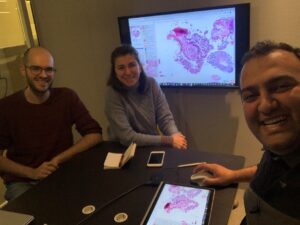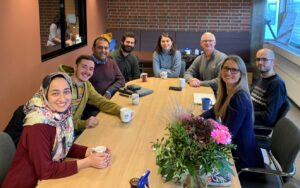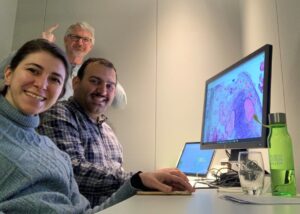Communication and working with your colleagues is not one-size-fits-all, and you need to realize the most efficient way to work with each.
One of the most valuable aspects of Marie Curie projects is secondment, which means a PhD candidate temporarily goes to another project’s contributing centre. I have been on secondment at Stavanger University Hospital for three months, and I found this experience of assistance to my project and my career development. In this post, I explain how going on secondment could help you gain a broader overview of your project’s topic and make your collaboration more efficiently; How the secondment provided a change and the chance to move on.
Figure 1: Discussing the bladder cancer project and annotation protocol with Saul and Umay
Working at a new university with your collaborators on the same project that you have been working on lets you get more familiar with your collaborator’s perspective and how they do the research. Gaining new experiences by working closely with your colleagues with different backgrounds develops a broader perspective for you (Figure 1).
Figure 2: Meeting with CLARIFY members to discuss the general roadmap of each ESR`s plan during the secondment
I think it is a must to know your colleagues very well to work more efficiently with them — communication and working with your colleagues is not one-size-fits-all, and you need to realize the most efficient way to work with each. Although working with international collaborators has many advantages, you have less opportunity to work in-person together, especially nowadays with covid restrictions. Nevertheless, going on secondment solves this issue and gives you the chance to interact more efficiently with your colleagues, which will help you progress your project more efficiently (Figure 2).
In conclusion, going on secondment provide you with a broader perspective over your project and a chance to move on more efficiently. I am honoured to have had the opportunity to work at Prof. Emiel Janssen’s research group for three months which has assisted me by providing a broader perspective on digital pathology, molecular biology, and bladder cancer pathology. Working at Emiel’s research group has taught me a lot about teamwork and team making, digital pathology and molecular biology; When Emiel is around, he always cheers up the group and motivates everyone (Figure3,4).
Figure 3: Annotating whole slide images and discussing digital pathology challenges and opportunities
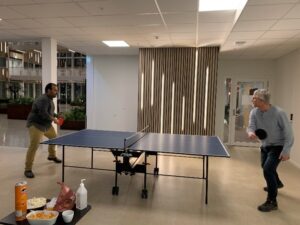
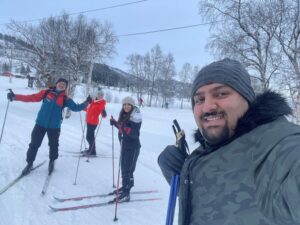
Figure 4: We had many fun activities to cheer up the team
Farbod Khoraminia – ESR10


